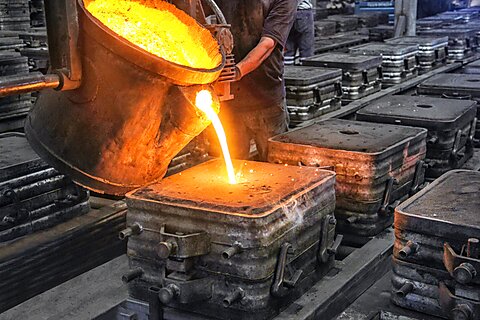US Steel’s Granite City Works plant in Illinois could become the showroom floor for President Donald Trump’s latest industrial policy experiment. The company is pausing production at the plant in November, but no layoffs are planned. Instead, workers will be paid their full salary to keep the plant open even though it won’t produce anything.
Wouldn’t idling the plant make more sense for the company’s finances?
It would, but because of the Trump administration’s shakedown of Nippon Steel—allowing the company to purchase US Steel in exchange for the federal government receiving a “golden share” in the merged firm—the president now has veto power over idling, closures, and much more at US Steel plants.
It’s reminiscent of the 2000s United Auto Workers “jobs bank,” an automaker-funded program that paid idled workers near-full wages. The crucial difference here is that the federal government—specifically the executive branch—is forcing a nominally private company to maintain make-work jobs.
Fostering make-work jobs is just one facet of the administration’s effective hostile takeover of US Steel. As part of the Nippon Steel acquisition, the company agreed to issue the federal government a single Class G preferred share—the “golden share.”
That one share gives the White House outsized control over the company’s operations:
The administration can appoint (or remove) one independent board director, and the board’s majority must be US citizens.
$10.8 billion in promised investment in US Steel by Nippon Steel through 2028 can’t be reduced, waived, or postponed.
The Granite City Works plant cannot be closed, idled, or sold before mid-2027; for all other sites, it’s mid-2035.
On trade matters (e.g., tariffs, petitions, remedies), the company must follow the administration’s recommendations.
It can’t acquire a US company that competes with US Steel or its suppliers without the administration’s consent.
Over any rolling six-month period, US Steel’s average US spot price for each steel product may not fall below 85 percent of the corresponding six-month average in the US Midwest Domestic Hot-Rolled Coil index.
No base-salary cuts for US Steel employees before mid-2030.
With a couple of exceptions, US Steel may not significantly change its US sourcing strategy for steel and raw inputs.
As our colleague Scott Lincicome explains, Trump effectively nationalized US Steel. Ownership stays private, but the control rights that decide a company’s footprint, pricing, and strategic moves are now explicitly political. Once the government inserts itself with explicit vetoes, a company has no choice but to adapt its operations to meet government demands. That means management has to court the White House for approval, as the decision-making process is now subject to negotiations with Trump. So, instead of focusing on “how can we make money?” US Steel has to focus on “how can we please Donald Trump?” instead.
Back to Granite City. Because the golden share locks in a no-closure/no-idle condition until mid-2027, US Steel will pay people to keep the plant “warm” even if the market doesn’t justify production. If demand is still weak come mid-2027, who takes the political heat for finally turning out the lights—the board, or the White House?
Meanwhile, steel-utilizing companies face the combined drag of steel tariffs and government dictates to maintain high producer prices. The provision to compel US Steel to maintain high prices demonstrates a significant problem with state control. When the government forbids pricing below a percentage of an index, it’s not merely guarding national security; it’s shaping commercial strategy. That may support US Steel’s margins in the near term. Still, it blunts competitive pressure and leads to costs being passed downstream to industries like automotives, appliances, and machinery that incorporate steel into producing final goods.
The political temptation inherent in this arrangement is as evident as it is dangerous. Once the lever is created, it will get pulled. Today it’s Granite City Works. Tomorrow, it could be whether a mill in Indiana can consolidate lines, whether a Minnesota mine can idle for a quarter, whether an acquisition of a scrap recycler “reduces competition,” or whether partnering with a foreign supplier runs afoul of evolving “national security” rationales.
Those aren’t improbable hypotheticals given the breadth of the administration’s consent menu (HQ, name, domiciling, investments, jobs, deals, etc.).
And let’s not forget that for six decades, the federal government has bowed to virtually every protectionist impulse of the domestic steel industry. This cozy relationship has enriched industry insiders at the expense of steel-consuming manufacturers, who face artificially high prices that undermine their competitiveness. The Nippon/US Steel deal further entrenches the federal government’s interventionist role. If recent news—a non-operational mill is required to maintain employment—is indicative of what’s to come, the results will be troubling.
In sum, the federal government has now gone from reviewing a foreign purchase on national security grounds to dictating much of the day-to-day decisions of how a domestic business with no defense contracts operates. As such, the economic policy equivalent of Pandora’s Box has been opened further. Congress should shut the lid and prevent further nationalization by term sheet.















